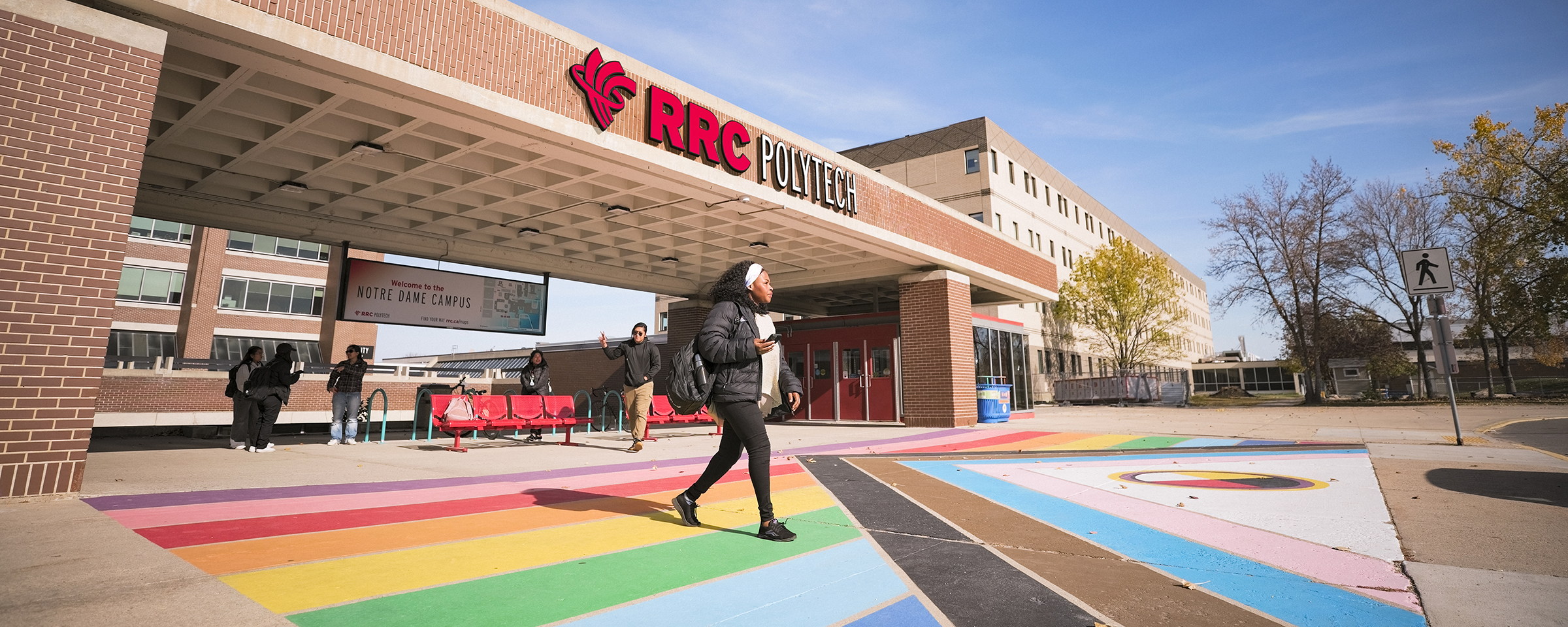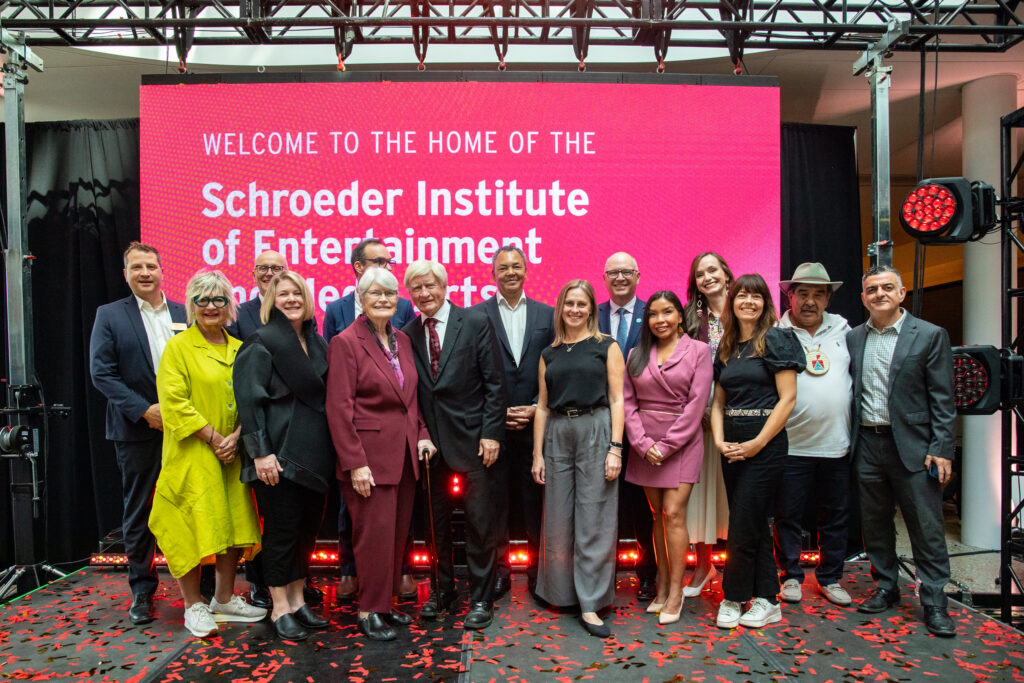$15M gift launches new Schroeder Institute of Entertainment and Media Arts
Transformational gift — the largest in RRC Polytech’s history — positions the College to produce the talent and expertise vital to the continued success and growth of Manitoba’s creative industries.
For more than 70 years, creative thinkers have explored ideas and sharpened their skills at RRC Polytech. Today, a $15-million gift from the Schroeder Foundation paves the way for continued growth and opportunity in the creative arts for the College, its students and the province of Manitoba.
Creative industries are at the core of RRC Polytech, and they are growing in Manitoba thanks to a local talent pool that continues to thrive.
The Schroeder Institute of Entertainment and Media Arts has been created to support those industries — and the province — in reaching the next level in this period of growth by ensuring that a pipeline of newly skilled local talent continues to flow and fill crucial industry roles, while engaging more deeply with industry partners and undertaking exciting opportunities to foster innovation through applied research.
Manitoba is increasingly becoming more competitive in creative areas across the prairies, the country and beyond. More productions are being filmed in Winnipeg and throughout the province, and more creative businesses are opening their doors while local companies are making their mark beyond our borders. Local training and talent are crucial to the success of the businesses that choose to operate here, and that is where RRC Polytech — and the Schroeder Institute — come in.
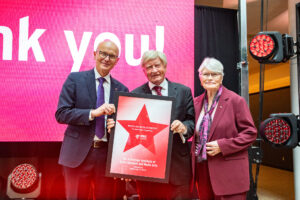 “RRC Polytech and the Schroeder Foundation have a shared vision for the future and what we can make possible through education, collaboration and research,” says Fred Meier, the College’s President and CEO.
“RRC Polytech and the Schroeder Foundation have a shared vision for the future and what we can make possible through education, collaboration and research,” says Fred Meier, the College’s President and CEO.
“The Schroeder Foundation’s decision to make this tremendous investment in RRC Polytech reflects that there are visionaries invested in our community who recognize the value of what we are doing here to support students on their way into careers in creative industries. This gift today will enable us to create so many more opportunities for Manitobans and our creative industries together.”
This partnership is a representation of the film-worthy story arc that the Schroeder family and RRC Polytech share — a history of humble beginnings leading to a path of advancing technology and industry, in Canada and beyond.
The Schroeder family and their foundation share the commitment to creating opportunity in Manitoba that RRC Polytech holds as a guiding principle.
RRC Polytech began as a small community college, and after almost a century of continuous growth and innovation, it is now a leader in producing creative talent that is ready to lead Manitoba into the future.
The College’s reputation in creative arts is the result of the relentless creativity and innovative teaching approaches that generation after generation of faculty and staff have brought to their programs.
This gift, and the creation of the new institute, further cements RRC Polytech as a trusted partner that industry can rely on to produce job-ready grads and support existing employees with opportunities to expand their skills.
The Schroeder Institute launches today with 12 core programs and continues to enhance its offerings. Two new programs — Animation and Entertainment Production Management — are poised to launch in the fall of 2025, while industry-informed micro-credential programs designed for current professionals to increase their skillsets will soon be added to the suite of offerings.
The Schroeder Institute is where students push the limits of their skills and build their networks and industry connections. They are taught by instructors with a wealth of industry experience who support them as they learn the skills necessary to break into careers in their chosen fields.
Developed with a 14-person advisory committee deeply entrenched in creative industries to guide programming, the Schroeder Institute will have an edge on what the industry needs.
“In my career in the film industry I have seen some incredible progress that is only going to continue,” says Carole Vivier, Advisory Committee Co-Chair and former CEO and Film Commissioner of Manitoba Film and Music.
“I have hired many RRC Polytech grads, and the possibilities that come from the creation of this institute are beyond exciting. I’m happy to be a part of bringing this to life and eager to see how the Schroeder Institute further supports and grows these industries in the years to come.”
The Schroeder Foundation is an ongoing partner of RRC Polytech, supporting student success through such initiatives as scholarships for their “Schroeder Students.” Now, this latest — and largest — investment of $15 million to ensure top creative-arts programming is a continuation of that support and legacy of giving in the spirit of furthering education.
“Maria and I grew up in Manitoba and will always be Winnipeggers. We believe in the work that RRC Polytech is doing to support students and the industries they aspire to be a part of,” says Walter Schroeder.
“We have lofty goals for the Institute. We believe it can attract creative sector industry partners — and students — from across Canada and around the world to Manitoba and Winnipeg, where they will discover the advantages of working, studying and living here.
“And we believe the Institute can create pathways for secondary learners — like the students we support through Sisler’s CREATE program — to accelerate their careers in their home province. We can’t wait to see these relationships grow with other Winnipeg high schools and we are excited to support the Institute.”
The Schroeder Institute will create a pipeline of newly skilled employees and foster deeper collaboration with industry. For the first time, RRC Polytech is creating an applied research program to foster innovation in emerging technologies in creative sectors.
The College’s ACE Project Space, alongside its Research Partnerships & Innovation team, will undertake projects aimed at establishing Canada’s leadership in animation, virtual production studios and user-experience testing.
Areas of applied-research opportunity within the Schroeder Institute are diverse and immense, from leveraging AI in media creation, to exploring how to best utilize immersive technologies like virtual or augmented reality in productions, and how to reduce the carbon footprint of production.
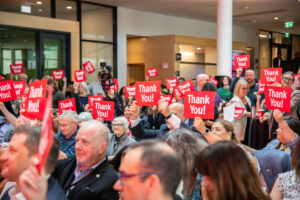 “Creative industries are thriving across the country, and Manitoba is proving that big things are happening in the heart of the prairies,” says the Hon. Dan Vandal, Minister of Northern Affairs. “This investment at RRC Polytech to support post-secondary education and our economies is welcome news.”
“Creative industries are thriving across the country, and Manitoba is proving that big things are happening in the heart of the prairies,” says the Hon. Dan Vandal, Minister of Northern Affairs. “This investment at RRC Polytech to support post-secondary education and our economies is welcome news.”
Creative arts contribute $1.6 billion to Manitoba’s GDP and comprise more than 3,400 businesses and 20,000 workers. The industry is now supported by the Manitoba Film and Video Production Tax Credit and the Interactive Digital Media Tax Credit.
“I am thrilled to celebrate the launch of the Schroeder Institute, which will allow students to pursue their passions right here in Manitoba,” says the Hon. Renée Cable, Minister of Advanced Education and Training.
“My deepest gratitude to RRC Polytech for their unwavering commitment to student success and their leadership in fostering collaboration with community and industry partners.”
Headquartered in Manitou a bi Bii daziigae, and located in the heart of the Exchange District, the Schroeder Institute gives students direct access to the creative core of Winnipeg, while they learn in state-of-the-art facilities with top industry-grade equipment and tools.
“This is an exciting time for Winnipeggers looking to break into creative fields,” says Winnipeg Mayor Scott Gillingham. “From film production to video game design to the arts, Winnipeg is a hub for creative industries, and RRC Polytech is nurturing the talent that makes our city an attractive home for these companies and productions.”
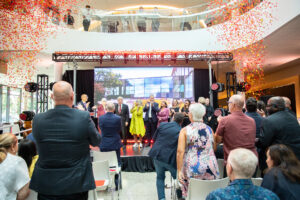 “This gift from Walter and Maria through the Schroeder Foundation towards RRC Polytech’s comprehensive campaign, In Front of What’s Ahead, is a rare example of truly transformational philanthropy that uplifts our community, industry partners and students for generations to come,” says David Petis, the College’s Executive Director, Advancement.
“This gift from Walter and Maria through the Schroeder Foundation towards RRC Polytech’s comprehensive campaign, In Front of What’s Ahead, is a rare example of truly transformational philanthropy that uplifts our community, industry partners and students for generations to come,” says David Petis, the College’s Executive Director, Advancement.
“It demonstrates what is possible with the support of community partners who believe in the value of a polytechnic education and providing opportunities for young people looking to break into industries they are passionate about.”
